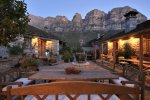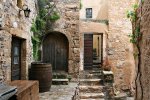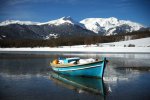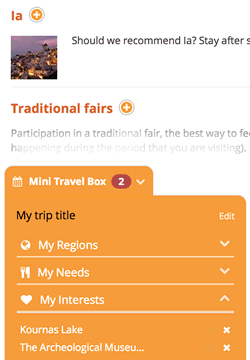

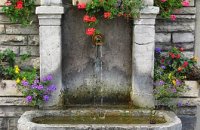

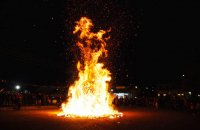

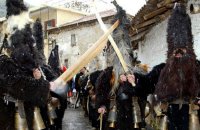
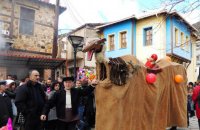
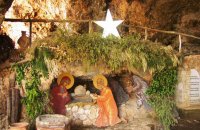
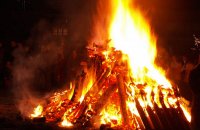
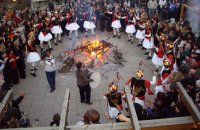

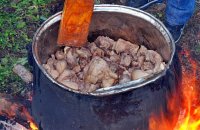

Jubilant melodies, fairytales, aromas coming from the kitchen, grates, bells, gambling, decorated Christmas boats and trees, elves and hobgoblins add to these special days a unique note in every region and every little heartstone in Greece. Everyone prepare themselves for the birth of Jesus and New Year’s Eve, family and friends come together, while lighten up streets and squares are crowded with people. On Christmastide each region has its own customs. Let’s take a look at them.
Epirus
Walnuts’ game
Walnut’s game is a traditional group game for children. The rules are: Every child puts one walnut on the line they have scored on the ground. Players stand on another line which is parallel to the walnuts’ line and is one or two meters away from it. Then, each player, slightly hunched, tries to hit a nut of the walnuts’ line using one of his bigger and round nuts. If he hits one, he takes it and then has another go for another nut. If he loses, plays the next one. The game ends when all the nuts are out of the line.
Burning kermes oak
On the night of Jesus birth shepherds went to the manger to worship him. As it was so dark, they wanted to light a fire, so they found a kermes oak and cut off some branches. Each of them took one, put them on fire and all of a sudden in the dark mountain cheerful fires and crackling noises began to flood in. Since then, in the villages of Arta, whoever visits their neighbor’s house to wish them a Merry Christmas as well as the married couples who visit their family, always go holding an oak branch, which they put on fire on their way to the house. So, they fill the dark villages’ alleys with joyful crackling fires.
Also in Ioannina they have the same custom. The only difference is that they don’t hold a whole branch on fire, because Ioannina is a big city. So, they keep a handful of bay or oak leaves, which they throw in the fireplace right after entering the house and wish good morning. And when the leaves have caught fire, they wish “lambs, goats, wives and husbands!” This is considered the best wish for every householder, when their flocks and family grow in number, their sons and daughters grow up, find their spouses and give birth to their grandchildren, who will keep alive the surname of the grandfather.
In other regions of Greece have revived the following traditions:
Thessaly
Feeding the fountain
On the dawn of Christmas Day or in some regions on New Year’s Eve, young women go the nearest fountain to “steal the” so called “speechless water”, named after the fact that girls don’t say a word on their way there. The girls spread the tap with butter and honey and wish good luck for their heartstone, good harvest for their crops and a good life for them. So, for a good harvest, they feed the tap with various delicacies, such as butter, bread, cheese, legumes or olive branches. The girl that arrives first there is said to have the best luck the whole year. Then, they put in their ewer a briar leaf and three gravels, they “steal” water and return home speechless until everyone in the house drink from the water. They also sprinkle the water from the ewer on the four corners of the house and they sift the three gravels in the house.
The wedding of fire
On Christmas Eve, in many parts of Greece, people “marry” in fire different types of wood, usually of thorny trees. As tradition has it, thorny trees drive away evil spirits, like goblins. In Thessaly, while returning home from the church, girls put next to the fireplace sprigs of cedar and boys sticks of wild cherry. The sprigs represent their personal wishes for a good life, so they choose the bendiest ones. The children watch with interest which branch will burn first, as this is a good sign for the kid who will marry first.
“Come on, the joy of the pig has come!”
Preparation for slaughtering of a pig has always been made with care and is accompanied with revelry until the early hours of the morning. The same procedure rolls around for two days. Close relatives fix the order in which each family will knacker a pig. For every slaughter are required 5-6 men at the age of 20-25. As the procedure was always followed by happiness and revelry, the day was named ironically “joy of the pig”.
“New Year’s Babaliuria”
Christmas holidays in Larissa begin on Christmas Eve, when children take to the streets singing Christmas carols and shouting “survaso”. On New Year’s Day people in Larissa revive “Babaliuria”, a New Year’s custom rooted in the cult of Dionysus. The costume of “Babaliurides” is white woolen trousers and waistband and a white shirt with wide sleeves. They wear white garters and tsaruchia, which is part of the traditional uniform worn by the Greek guards known as Evzones. On their waist they wear a thick woolen cloth, folded several times, to which they tie big and heavy bells. They put a special mask made of animal’s fleece, the so-called “fulina”. The mask is white or black with three slits for the eyes and mouth. The costume of each “Babaliuris” includes a wooden curved sword.
Babaliurides wait for the devotional to end, so that they take to the streets. They are always accompanied by “adelfoyirtis”, who holds a money box and collects money that people offer. Before the end of New Year’s devotional, Babaliurides have reached the three churches of the village.
Now, as people come out of the church, they are surprised by the appearance of Babaliurides, who won’t let them pass unless they put money on their swords. Once they have put money on them, “adelfoyirtis” takes it and wish them a Happy New Year. Afterwards, Babaliurides head to the square and draw the attention of locals and tourists due to the noise of their bells. Then, they leave and go to village’s cafes or wander around in the village’s streets until late at night. It is believed that the tradition of “Babaliuria” shoos evil spirits and brings a peaceful and happy new year.
Northern Greece
Jesus wood
In the villages of northern Greece, on Christmas and New Year’s Eve, each householder searches in the fields for the most beautiful, sturdiest and thickest wood of oak or olive tree and brings it home. This wood is called “Jesus wood” and will burn in the fireplace for the whole Christmastide, from Christmas Day till Epiphany. It is said that the ashes of this wood protect the heartstone and the family’s crops from evil spirits.
Before householders bring Jesus wood, housewives must have cleaned the house with care, especially the fireplace, so that there’s no ash left. They even clean the chimney to make it difficult for goblings and evil demons to climb down, as Christmas stories say. On the evening of Christmas Eve, when the whole family gathers around the fireplace, father lights the new fire and puts Jesus wood in it. According to folkway, as Jesus wood burns, Jesus also warms up in the manger. In each household, the family tries to keep Jesus wood on fire till Epiphany.
Camel tradition
Every year, on New Year’s Eve, the members of the cultural association of Thessaloniki “Kavakli” take to the streets of the city, but not to sing Christmas carols; they are dressed up like camels and yell slogans. Their goal is to mislead the soldiers of Herod the Great, who search for newborn Jesus and prevent them from killing him.
Traditional outdoor “fufudes”
Christmas in the city of Kavala is celebrated with the visit of Santa Claus and with the traditional grills. On Christmas Eve the shopping centre looks like a huge barbeque. On most walkways and pavements salesmen put outdoor grills, the so called “fufudes”, and offer passersby grilled meat and local red wine.
“Fufudes are set again on New Year’s Eve, this time occupying more space. The big feast begins early at noon with plenty of wine, live traditional music and outdoor grills and goes on till afternoon. It is like a cordial welcome to the New Year.
There is another custom that revives on Christmas Eve in the city and specifically in the quarter of Nea Karvali and is the visit of Santa Claus, who after his long journey from Kayseri reached folklore village Akodisma and stayed there till the last day of the year.
Tradition of “Momoyeri”
In the villages Platania and Sitagri of Prefecture of Drama we find the Christmas tradition of old mimes (“Momoyeri”), which goes back to the Pontic refugees. The name of the tradition in Greek consists of the words “mimos”, which means mime and “yeri”, who are the old people. Momoyeri wear wolf’s, male goat’s or other animal’s skins or are dressed up like old men armed with swords.
Momoyeri appear during the whole Christmastide, they gather all together and take to the villages’ streets singing carols and giving good wishes to bring good luck for the New Year. When two groups of friends meet, they compete with each other on thinking the best wish. Variations of this tradition are found in villages of Kozani and Kastoria and are called “ragutsaria”.
Dancing around the twigs
The tradition of twigs, known as “kladaries”, is part of Christmastide in the region of Voio, western Macedonia. Preparation for this custom begins on 27th October, when children and teenagers run in the fields and hills and gather twigs and fodders. They look for cedar twigs, which have a particular fragrance and then they store them to dry completely.
On 25th December at noon, all the twigs are already stacked in an open space where the tradition will take place. In the evening the older man of the village puts the pile on fire. Then, people start dancing around the fire. In some places, men with bells hanging on them go round the fire reminding something of Dionysian worship.
The whole atmosphere and the scent of cedar create indeed an impression of a special ceremony. In some regions of Voio, this custom revives on Carnival and specifically on Cheesefare Sunday.
In Florina, residents welcome Jesus birth by lighting huge fires at midnight, which symbolizes the fire that lit the shepherds of Bethlehem for newborn Jesus to warm up. They also light fires in the evening of New Year’s Day.
“Kolida babo”
In Pela, revives the custom “Kolida babo” which relates to Herod’s Slaughter of the Innocents. The locals light fires in the evening shouting “kolida babo”, which means “grandma, there’s a slaughter”. Lighting a fire is a way to inform people, so that they protect themselves.
Curved leaves
In Thasos Island, till today, families revive the custom of curved leaves, which is the following: they gather around the fireplace, they pull to their side charcoal and put on it olive leaves having in their minds a wish. The one, whose leaf is the curviest at the end, will have good luck, as his or her wish will come true.
Peloponisos
Breaking a pomegranate
In the morning of New Year’s Day, families go to the church and father carries a pomegranate to bless it. On the way back, he has to ring the doorbell and be the first to enter as a guest with a pomegranate in his hand to bring good luck.
While entering, he hits the pomegranate on the floor, behind the door, so that the seeds scatter all over the place, and at the same time says: “good health, happiness and joy to all of us; let money flow in our home like the seeds of the pomegranate”. And children look if the seeds are crispy and deep red. If the seeds are good and pretty means that the new year will be blessed and happy.
Chasing birds in Mani
During Lent most of the children used to go hunting. At night, when it was really cold, they were taking their torches and wandering in the rubble and caves of Mani looking for small birds that had found refuge there. Τhey used torches to blind them or rubber slings to hit and catch them. Then, they used to bring them to their mothers or older sisters, who plucked and salted them, so that they would be ready on Christmas.
Many children were picking more than twenty birds and boasted about their hunting ability and their harvest. And as Christmas was getting close, preparations began, households were decorated and the whole village was cleaned. Everything was ready to welcome the emigrants who would come to spend Christmastide with their loved ones and relatives.
Crete
Christmas cake
Kneading Christmas cake is considered an activity purely Christian and divine. Women knead with special reverence and patience. It is a whole ritual. The ingredients used are expensive, such as riddled flour, rosewater, honey, sesame, cinnamon and cloves and women say while kneading: “Jesus Christ is born and the light goes up to make the dough expand”. They continue kneading, then they take half of the dough and make a bagel. With the rest of it make a cross and put in the centre of it a walnut or an egg, which symbolizes fertility.
Christmas cake is eaten on Christmas Day and is considered blessed bread, as is the one that will help the whole family in the New Year. They cut it n pieces giving good wishes.
Thrace
Custom of “Rugatsia”
In Pithio children used to sing the carols “koliada” one day earlier than Christmas Eve. Boys were taking to the streets early in the morning shouting “koliada babu, tsik, tsik, tsik…” On Christmas Day young men in small groups of four were singing on the streets and in the houses: “forty days we’re waiting for Jesus…”
These groups, called “Rugatsia”, while entering a house, used to sit and sing in groups of two in turn this song, as the song is really long and without pauses, making it more difficult. Moreover, they had to sing it in many houses till late at night. When Rugatsia were visiting a house, there had to be there all the members of the family. They were sitting, singing, eating treats, then they used to take a tip and leave for the next house.
Islands
Ai Yanis Cave in Marathokefala, Kisamos
In Ai Yanis Cave on Christmas is celebrated Archieratical Divine Liturgy. The representation of the manger where Jesus was born, with sheep, shepherds, fire and the star shining gives to the ceremony a distinct atmosphere. In the past, from Christmas Eve farmers, shepherds and sailors used to say that different wind powers struggle about who will be born and baptized first. Whoever is born on Christmas Day, that means whoever prevails over the others, will prevail on Epiphany and also the next year. In the old times, in the evening of Christmas Eve, housewives used to cut off branches and stems and take them home. They used to put them in glasses with water and waited for them to flower.
Kefalonian cologne
On New Year's Eve in Kefalonia Island, children put a statuette of the female Santa Claus at the house entrance to protect the house. At noon, women cook pancakes and in the evening, residents of Argostoli go to the church holding colonges and sprinkle passersby. On the way back, they break a pomegranate at the entrance and they count its seeds. Each seed symbolizes a wish that will come true the new year.
Santa Claus boats
In Chios city on New Year's Eve revives the custom of Santa Claus boats. People from different churches construct small decorative boats. There is a competition to bring out the best boat in quality and similarity to real ones, while groups, the crew of each boat signs Christmas carols.
Source : www.ipiros.gr/

